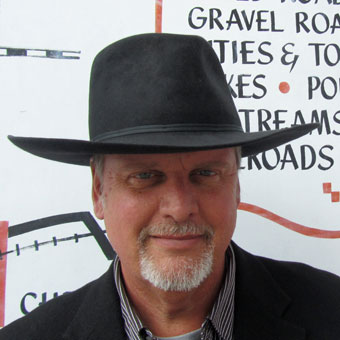
Michael Daugherty
Short Biography:
Michael Daugherty is one of the most frequently commissioned, programmed, and recorded composers on the American concert music scene today, hailed by The Times (UK) as “a master icon maker” with a “maverick imagination, fearless structural sense and meticulous ear.”
Daugherty first came to international attention when the Baltimore Symphony Orchestra performed his Metropolis Symphony at Carnegie Hall in 1994. Since that time, Daugherty’s music has entered the orchestral, band and chamber music repertoire and made him, according to the League of American Orchestras, one of the ten most performed living American composers.
Daugherty is a frequent guest of professional orchestras, festivals, universities and conservatories around the world. He has been the Composer-in-Residence with the Louisville Symphony Orchestra, Detroit Symphony Orchestra, Colorado Symphony Orchestra, and Cabrillo Festival of Contemporary Music, among others. His music has been conducted and performed by Marin Alsop, Michael Christie, Kristjan Järvi, Michael Tilson Thomas, Emmanuel Pahud, Ida Kavafian, Ensemble Intercontemporain, Kronos Quartet, and London Sinfonietta.
Daugherty has received numerous awards, distinctions, and fellowships for his music including a Fulbright Fellowship (1977), Kennedy Center Friedheim Award (1989), Goddard Lieberson Fellowship from the American Academy of Arts and Letters (1991), fellowships from the National Endowment for the Arts (1992) and the Guggenheim Foundation (1996), the Stoeger Prize from the Chamber Music Society of Lincoln Center (2000) and the Michigan Governor’s Award (2004). Daugherty's music can be heard on the Albany, Argo, Delos, Equilibrium, Naxos, Nonesuch and Sony labels. In 2011, the Nashville Symphony’s Naxos recording of Daugherty’s Metropolis Symphony and Deus ex Machina was honored with three GRAMMY® Awards, including Best Classical Contemporary Composition for Deus ex Machina.
His music is published by Peermusic Classical, and since 2003 by Boosey and Hawkes.
— July 2011
This biography can be reproduced free of charge in concert programs with the following credit:
Reprinted by kind permission of Boosey & Hawkes.
Long Biography:
Michael Daugherty is one of the most commissioned, performed, and recorded composers on the American concert music scene today. His music is rich with cultural allusions and bears the stamp of classic modernism, with colliding tonalities and blocks of sound; at the same time, his melodies can be eloquent and stirring. Daugherty has been hailed by The Times (UK) as “a master icon maker” with a “maverick imagination, fearless structural sense and meticulous ear.” Daugherty first came to international attention when the Baltimore Symphony Orchestra, conducted by David Zinman, performed his Metropolis Symphony at Carnegie Hall in 1994. Since that time, Daugherty’s music has entered the orchestral, band and chamber music repertory and made him, according to the League of American Orchestras, one of the ten most performed living American composers.
In 2011, the Nashville Symphony’s Naxos recording of Daugherty’s Metropolis Symphony and Deus ex Machina was honored with three GRAMMY® Awards, including Best Classical Contemporary Composition for Deus ex Machina. Also in 2011, Naxos released a new CD of Daugherty's orchestral music to great acclaim entitled Route 66 with Marin Alsop conducting the Bournemouth Symphony.
Born in 1954 in Cedar Rapids, Iowa, Daugherty is the son of a dance-band drummer and the oldest of five brothers, all professional musicians. He studied music composition at the University of North Texas (1972-76), the Manhattan School of Music (1976-78), and computer music at Pierre Boulez’s IRCAM in Paris (1979-80). Daugherty received his doctorate from Yale University in 1986 where his teachers included Jacob Druckman, Earle Brown, Roger Reynolds, and Bernard Rands. During this time, he also collaborated with jazz arranger Gil Evans in New York, and pursued further studies with composer György Ligeti in Hamburg, Germany (1982-84). After teaching music composition from 1986-90 at the Oberlin Conservatory of Music, Daugherty joined the School of Music at the University of Michigan (Ann Arbor) in 1991, where he is Professor of Composition and a mentor to many of today’s most talented young composers.
Daugherty has been Composer-in-Residence with the Louisville Symphony Orchestra (2000), Detroit Symphony Orchestra (1999-2003), Colorado Symphony Orchestra (2001-02), Cabrillo Festival of Contemporary Music (2001-04, 2006-08, 2011), Westshore Symphony Orchestra (2005-06), Eugene Symphony (2006), the Henry Mancini Summer Institute (2006), the Music from Angel Fire Chamber Music Festival (2006), and the Pacific Symphony (2010).
Daugherty has received numerous awards, distinctions, and fellowships for his music, including: a Fulbright Fellowship (1977), the Kennedy Center Friedheim Award (1989), the Goddard Lieberson Fellowship from the American Academy of Arts and Letters (1991), fellowships from the National Endowment for the Arts (1992) and the Guggenheim Foundation (1996), and the Stoeger Prize from the Chamber Music Society of Lincoln Center (2000). In 2005, Daugherty received the Lancaster Symphony Orchestra Composer’s Award, and in 2007, the Delaware Symphony Orchestra selected Daugherty as the winner of the A.I. DuPont Award. Also in 2007, he received the American Bandmasters Association Ostwald Award for his composition Raise the Roof for Timpani and Symphonic Band. Daugherty has been named “Outstanding Classical Composer” at the Detroit Music Awards in 2007, 2009 and 2010. His GRAMMY® award winning recordings can be heard on Albany, Argo, Delos, Equilibrium, Klavier, Naxos and Nonesuch labels.
— July 2011
This biography can be reproduced free of charge in concert programs with the following credit:
Reprinted by kind permission of Boosey & Hawkes.
